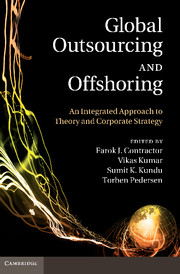Book contents
- Frontmatter
- Contents
- List of figures
- List of tables
- List of boxes
- Notes on contributors
- Preface: the reconfiguration of the world economy
- Part I Conceptual frameworks and theories
- 1 Global outsourcing and offshoring
- 2 Globalization of R&D
- 3 A theory of the outsourcing firm
- Part II The offshoring and outsourcing of R&D and innovative activities
- Part III Management issues in offshoring and virtual teamwork
- Part IV Empirical analyses and case studies of outsourcing and offshoring
- Index
- References
2 - Globalization of R&D
Offshoring innovative activity to emerging economies
Published online by Cambridge University Press: 10 January 2011
- Frontmatter
- Contents
- List of figures
- List of tables
- List of boxes
- Notes on contributors
- Preface: the reconfiguration of the world economy
- Part I Conceptual frameworks and theories
- 1 Global outsourcing and offshoring
- 2 Globalization of R&D
- 3 A theory of the outsourcing firm
- Part II The offshoring and outsourcing of R&D and innovative activities
- Part III Management issues in offshoring and virtual teamwork
- Part IV Empirical analyses and case studies of outsourcing and offshoring
- Index
- References
Summary
Introduction
Recent years have seen a major debate in academia, the media, and policy circles on the impact of the phenomenon of offshoring on the US economy. The relatively sluggish job creation numbers have been blamed on offshoring, among other factors. Varying estimates of job migration and potential future job losses have been developed, and supporters have lined up on both sides of the issue, debating the pros and cons of offshoring for the US economy (for an early account of the impact of offshoring on jobs, see Bardhan and Kroll [2003]).
Broadly speaking, there are two schools of thought regarding the magnitude and potential impact of offshoring. The votaries of a major and continuing job loss note that the confluence of the five factors that gave rise to the phenomenon – (1) globalization, (2) free markets, (3) information and communications technology, (4) wage differentials, and (5) the large numbers of college students graduating annually in developing countries – show no signs of abating. They also claim there are no signs of any new, emerging sectors or occupations that will take up the slack, as the US software sector did during the 1990s when manufacturing jobs continued to decline. The case for minor impact is based on the fact that the magnitude of job loss attributable to offshoring has been minor so far.
- Type
- Chapter
- Information
- Global Outsourcing and OffshoringAn Integrated Approach to Theory and Corporate Strategy, pp. 48 - 72Publisher: Cambridge University PressPrint publication year: 2010



